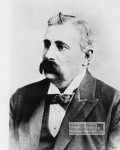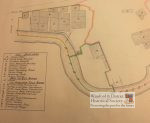A LETTER FROM THE PAST
After the death of Margaret Thomas, one of the founder members of our Society, we were contacted by her daughter Janet. Amongst her mother’s many books and papers there were some that Janet thought we would appreciate. Many heavy parcels then made their way to Winsford and into our archives. Months passed and we were once more contacted by Janet to alert us to the existence of a letter from Mr. John Henry Cooke, Solicitor and Clerk to Winsford Urban District Council. He had written to the new Chairman – Mr. Parker – his version of events reminiscing on 50 years of progress in the town. Janet had sent this to the Cheshire Record Office but thought that we would want to know of its existence. A visit to Chester and hours of further research resulted in the following article. It serves to remind us how important it is to treasure the letters and memories our ancestors leave behind and what an important resource for social history they are.
In his letter written on 7th September 1925, John Henry Cooke recalls some of the events during his time with the Local Board and later the Urban Council. He was a local solicitor but, on the 7th September 1875, he was elected as Clerk to the newly formed Winsford Local Board. His letter makes interesting reading and has provided material for further research.
 ‘The reason for the formation of a Local Board was that the Northwich Rural Sanitary Authority proposed to purchase a House then Known as Breeze Hill (now known as Holly Hurst) situate in Geneva Road [that] should be utilized as an Isolation Hospital.’
‘The reason for the formation of a Local Board was that the Northwich Rural Sanitary Authority proposed to purchase a House then Known as Breeze Hill (now known as Holly Hurst) situate in Geneva Road [that] should be utilized as an Isolation Hospital.’
Who owned Breeze Hill? If we look at the 1871 census we find that the occupant of Breeze Hill is Thomas Bradbury aged 67. He is a manure merchant from Market Drayton and lives here with his wife Elizabeth E Bradbury aged 44 from Winsford. They have two servants – Alice Tomkins, aged 26, domestic servant and cook from Malpas and Ellen Tomkins aged 19 housemaid also from Malpas. The name Bradbury is well known in Winsford because of Lord Bradbury who was Joint Permanent Secretary to the Treasury from1913 to 1919. During that time he was responsible for issuing the first treasury notes which, because they bore his signature, became known as ‘Bradbury’s’. So was there a connection? Going back to the 1861 census we find that Thomas S Bradbury is married to Elizabeth E and is living at Clive House, a farmer of 122 acres employing 3 labourers and also a bone manufacturer. There are three cousins – Walter Bradbury, Mary E Bradbury and Honor Bradbury as well as 6 other people living at the same address. Further research reveals that there is indeed a connection to Lord Bradbury. Thomas S Bradbury was the son of George Bradbury and Ann Swanick and is the brother of John born in 1811. John is the father of Lord Bradbury who is therefore the nephew of the owner of Breeze Hill. A search on Ancestry revealed an extract from the diary of George Bradbury (1797-1890) written in 1885 referring to his son Thomas ‘After a time in the Manchester Trade and representing the celebrated corn law repealer Richard Cobden, he took the Bone Works at Winsford and the farm at Clive.’ Thomas died in Cheltenham on 30th September 1880.
However it would appear that Breeze Hill was unsuitable for their needs as the letter continues – ‘The Town thought this a very unfavourable position’. Unfortunately there were a great many cases of smallpox at this time and the need for an isolation hospital was urgent. The minutes of the Local Board inform us that a letter was received on June 30th 1876 from Mr. Cheshire, the Clerk to the Northwich Board of Guardians, stating that the Winsford Board could have use of the Fever Hospital at the Leftwich Workhouse on the payment of 15/- per week for each patient to cover the cost of maintenance, medical attendance and medicine. There was obviously no end to his generosity as the letter continues by offering ‘the use of the fever van when not already in use, on applying to the master of the workhouse and paying 20/- per week per patient’. The Board were however required to find – at their own expense – ‘a horse and a man to drive the same and to be answerable for any damage that was done to the same.’ It was hardly surprising to read that very soon after this a proposal was put to the Middlewich Board ‘as to a Fever Hospital to be used jointly by the ratepayers of the two districts’.
John Henry Cooke’s letter then further outlines the state of Winsford in the 1870s and the need for fresh water and improved street conditions.
‘The Town wished to have a good water supply because to a large extent the People of Over were dependent upon a well situate at the High Street end of Well Street which was not then in existence. The foot paths in the Town were not very favourable & there were a lot of dirty holes so that people had to walk carefully. Of course the Town was not lighted because Mr. H J Falk then residing at Meadow Bank always opposed the lighting of the District. Of course there was no system of sewerage. I remember the roads at that time principally High St. were covered with 2 inch macadam & as we had no steam roller the macadam was laid bare & horse guards were placed along the roads to direct the traffic from one side of the road to the other. As soon as the Board was formed the members began to look out for Water Supply (& principally through the effort of the late Mr. Jno Stubbs) the present springs were found at Little Budworth. Ultimately we bought the springs from the late Lord Shrewsbury for £1500. And none of the Streets known as Dean St. John St. & Well St. were then in existence. They were simply pasture fields.’
He continues by mentioning the bridge over the river Weaver which he says ‘consisted of a stone Bridge with one or two arches & when these arches began to subside a temporary wooden bridge had to be erected a short distance away from the present bridge. I remember at that time Wombwell’s Menagerie was coming to Winsford & the big Elephant had to cross the temporary wooden bridge. We all wondered whether it would get safely across but it did so. I have known the Market Place sink 20 ft. in 20 years. This was at the time about 18when the trade was manufacturing an enormous quantity of salt & the brine was drawn from places close to.’
The reference to Wombwell intrigued me and led to further research. George Wombwell, born in 1777 near Saffron Walden, was a famous menagerie exhibitor who founded Wombwell’s Travelling Menagerie. In 1804 George was a shoemaker in London but, after buying two snakes from the London docks and making a profit exhibiting them around the taverns of Soho, he decided that there was a possibility of making a fortune with exotic animals. He soon collected a large number from all over the world and in 1805 founded his travelling menagerie. By 1839 it totaled 15 wagons and was accompanied by a brass band. Wombwell died in 1850 and the company was run for the next 16 years by his wife. Later it was passed to his nephew who auctioned it off in the old Waverley Market in April 1872 for a staggering sum equivalent to £250,000 in today’s money. Unfortunately Mr. Cooke’s letter does not give the date for the visit to Winsford.
John Henry then completes his letter with references to a much improved town and a little of his own circumstances. ‘You will know how the Town has improved since. We bought a steam roller for £400 & although there was much objection to the purchase, we received in income from the Loan of it to other authorities, as much as we had paid for it in one year besides doing our own work. The Asiatic cholera was rampant on Victoria Terrace. The town was full of Cesspools. Mr. Bancroft C. E. of Manchester was appointed Engineer to the Water Works. The first meeting of the old Local Board was held in the ante-room of the then Town Hall. I very well remember complaints being made of the Gas Company charging 6/- for a 1000 cubic ft. for gas supplied. I see from the Minutes that the rate levied for the first half year was 9d in the £. I was admitted a Solicitor Michaelmas Term 1870 so that I have been on the role for 55 years. I was born at the Bank House now occupied by Mrs. Ivison on the 11 Oct. 1848 so that next month I shall be 77 years of age. My only inclination is to resign but I am quite agreeable to whatever the Council may decide. I have always been on good terms with the Board & the Council I feel that my age & the infirmity of my hearing does not entitle me to continue to impose my services on the Council. I am not a rich man because I have a large family to maintain. I have spent all my salary & profits from my profession in the Town.’
Mr. Cooke died on 29 May 1928 aged 79. Small in stature he was affectionately known as ‘Little John Henry’ or ‘Little Mr. Winsford’. Despite his size he was well known, well respected and achieved much for the people of the town. The Chronicle in June 1928 describes him as ‘vivacious, so impatient of obstacles and at times quite a little pugnacious. Yet withal so forgiving, so lovable, so altogether admirable. There really was no one quite like Mr. J H Cooke in actual work-a-day life. So accessible to all, he was a lawyer, a scholar and a gentleman.’
Article by Mary Curry